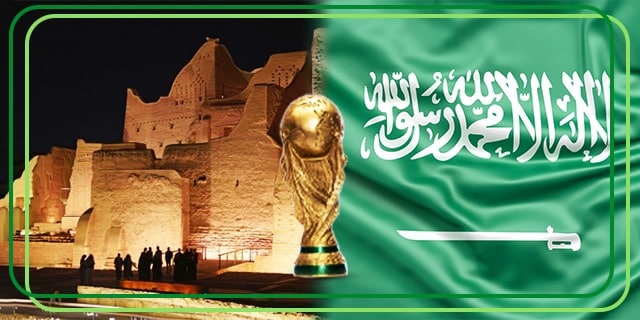محتوى المقالة
Introduction
The 2034 FIFA World Cup is set to make history as it unfolds in Saudi Arabia, marking the first time the tournament will be hosted solely by an Arab nation. This monumental event is poised to showcase the kingdom’s cultural heritage, ambitious infrastructure projects, and its evolving role on the global sports stage. In this article we will discover the details of hosting the 2034 FIFA world cup Saudi Arabia
Host Selection Process of the 2034 FIFA world cup Saudi Arabia.

The journey to selecting Saudi Arabia as the host for the 2034 World Cup was both swift and strategic. In October 2023, FIFA initiated the bidding process, initially mirroring the requirements set for the 2030 tournament. However, adjustments were made, notably reducing the number of existing stadiums with a minimum capacity of 40,000 from seven to four, broadening the eligibility for potential hosts.
Due to FIFA’s confederation rotation policy, only member associations from the Asian Football Confederation (AFC) and the Oceania Football Confederation (OFC) were eligible to bid. This policy, combined with the decision to host the 2030 World Cup across multiple continents, effectively narrowed the field for 2034.
Saudi Arabia promptly announced its intention to bid on October 4, 2023, garnering substantial support from over 70 member associations. The kingdom’s bid emphasized its commitment to hosting a summer tournament, despite the region’s challenging climate during that season.
On December 11, 2024, during an Extraordinary FIFA Congress meeting, Saudi Arabia was officially confirmed as the host hosting the 2034 FIFA world cup Saudi Arabia. This decision underscores the kingdom’s growing influence in international sports and its dedication to Vision 2030, an ambitious initiative aimed at diversifying its economy and enhancing its global image.
Infrastructure and Preparations
Hosting the 2034 FIFA world cup Saudi Arabia necessitates world-class infrastructure, and Saudi Arabia has unveiled plans to meet and exceed these requirements. The kingdom intends to construct 11 new stadiums, each equipped with state-of-the-art facilities to accommodate the expanded 48-team format. Additionally, there are plans for a £1 trillion megacity, Neom, envisioned as a futuristic urban center that will play a pivotal role during the tournament.
Complementing these developments is the construction of the world’s largest airport, slated to open in 2030, which will facilitate the influx of international visitors and streamline transportation logistics. These projects are integral components of Crown Prince Mohammed bin Salman’s Vision 2030, reflecting a commitment to modernization and economic diversification.
Global Reactions and Future Implications

The announcement of Saudi Arabia as the 2034 World Cup host has sparked a wide range of reactions globally. Supporters of the decision highlight the kingdom’s ambitious modernization efforts and its ability to deliver a world-class tournament.
For Saudi Arabia, this event is an opportunity to establish itself as a key player on the international stage, not just in sports but in diplomacy and cultural exchanges. The successful hosting of the tournament could open doors for future global events in the region, further solidifying the Middle East’s growing influence in global sports.
Stadiums for the 2034 FIFA world cup Saudi Arabia
Hosting promises to showcase state-of-the-art stadiums that blend cutting-edge technology, sustainability, and cultural heritage. The kingdom has announced plans to utilize existing venues, significantly upgrade others, and construct new, world-class stadiums to meet FIFA’s requirements for the expanded 48-team tournament format.
Impact of Hosting the 2034 FIFA world cup Saudi Arabia
on Tourism
Hosting the 2034 FIFA world cup Saudi Arabia is set to significantly boost tourism in Saudi Arabia, aligning seamlessly with the kingdom’s Vision 2030 strategy to diversify its economy and position itself as a global tourism destination. This mega-event is expected to transform Saudi Arabia’s tourism landscape in multiple ways, leaving a lasting legacy for the nation.
Economic and Social Impact

Hosting the 2034 FIFA world cup Saudi Arabia is anticipated to have profound economic and social impacts on Saudi Arabia. The influx of tourists and global attention is expected to boost the hospitality, retail, and service sectors, contributing to economic diversification efforts. The development of infrastructure projects, including stadiums, transportation networks, and urban centers, is projected to create numerous job opportunities and stimulate local economies.
Socially, the tournament offers a platform for cultural exchange, allowing Saudi Arabia to showcase its heritage and traditions to a global audience. It also presents an opportunity to challenge stereotypes and promote a more nuanced understanding of the kingdom.
Environmental Considerations
The environmental impact of hosting a mega-event like the World Cup is a significant concern. Saudi Arabia has pledged to implement sustainable practices in line with global environmental standards. Plans include the use of renewable energy sources to power stadiums and facilities, as well as initiatives to reduce carbon emissions associated with construction and transportation.
The development of Neom, the futuristic megacity, is being promoted as a model of sustainability, with designs emphasizing green spaces, smart infrastructure, and minimal environmental footprints. Discover what are the goals of neom candles city to achieve Vision 2030.
Cultural Showcase: Bridging Worlds
The 2034 FIFA World Cup is not just about football; it’s also a celebration of culture. Saudi Arabia intends to blend its rich heritage with modern entertainment to captivate visitors. Themed festivals, traditional music, and dance performances are expected to complement the global football fever. For fans, this will be an opportunity to experience Saudi cuisine, art, and hospitality firsthand.
Vision 2030 and the Legacy of the 2034 World Cup
One of the defining aspects of the 2034 FIFA World Cup will be its alignment with Vision 2030. This national initiative aims to transform Saudi Arabia into a vibrant, diversified economy. By hosting the tournament, the kingdom plans to:
- Strengthen its tourism sector.
- Enhance global perception.
- Leave behind a legacy of infrastructure and economic growth.
The focus on sustainability, economic diversification, and innovation ensures that the benefits of hosting extend well beyond the tournament.
Anticipation Builds: Countdown to 2034
As preparations intensify, the global football community is already looking forward to the unique experience that Saudi Arabia will offer in 2034. With its bold vision, state-of-the-art infrastructure, and deep cultural roots, the stage is set for a historic World Cup that promises to captivate the world.
Conclusion
The 2034 FIFA World Cup Saudi Arabia is more than just a sporting event; it’s a transformative moment for the kingdom and a testament to the global appeal of football. The tournament will bring fans from all walks of life together, fostering unity, showcasing cultural diversity, and setting a new benchmark for future World Cups.

